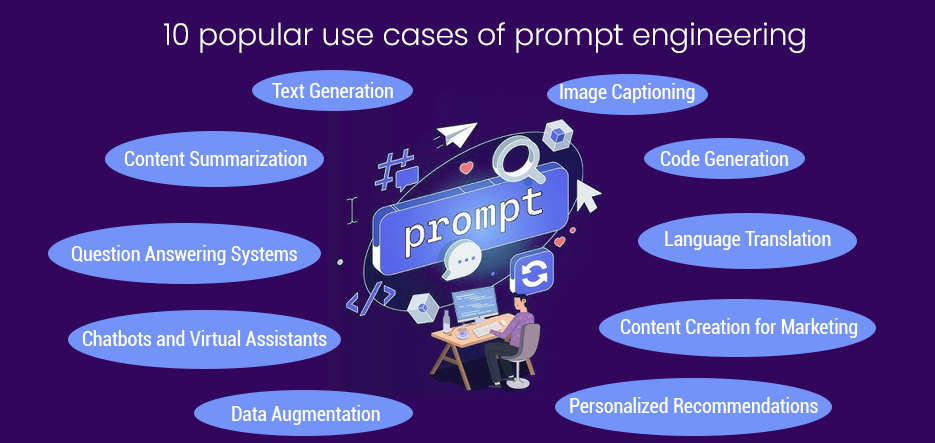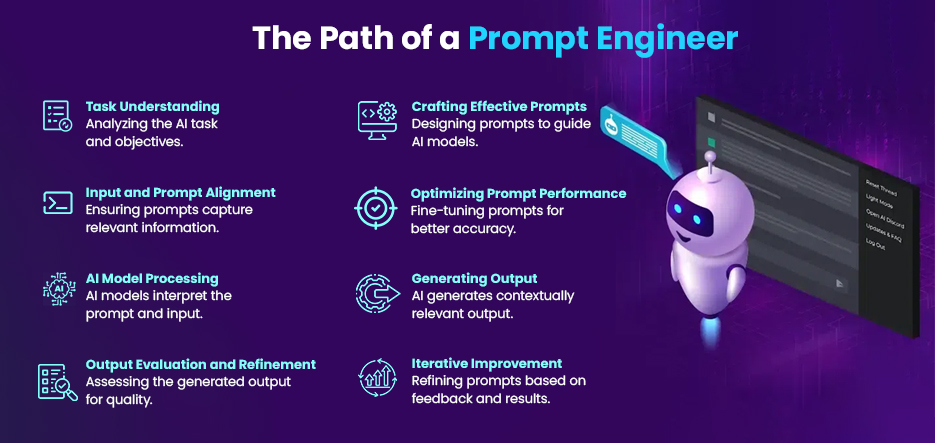Table of Contents
Artificial Intelligence is a revolution in all technologies. From automating tasks to generating content, it has brought unprecedented changes. With an anticipated compound annual growth rate of 37.7%, it is evident that the AI market is expanding rapidly, indicating the growing significance of the technology in all sectors of the economy. However, AI comes with its challenges. AI cannot work without the help of human intelligence, it needs to be trained, tested, and tuned to perform the tasks. This is where Prompt engineering for AI comes in.
Consider engaging in a conversation with a machine in which you give it a cue or a “prompt,” and it reacts by providing pertinent data or actions. That’s what Prompt engineering for AI is all about. “Prompt engineering is an amazingly high leveraged skill” said Open AI Ceo Sam Altman. It involves formulating the ideal queries or directives to direct AI models—particularly Large Language Models (LLMs)—to generate the intended results. Knowing prompt engineering is essential whether you’re a professional trying to use language models or a techy interested in the newest developments in AI. Giving good inputs to a generative AI can mean better results.
What is AI Prompt Engineering?
The practice of directing generative artificial intelligence (generative AI) systems to produce desired results is known as prompt engineering. Though generative AI aims to emulate human behavior, producing meaningful, high-quality output necessitates precise instructions. Prompt engineering skills include selecting the most suitable formats, expressions, words, and symbols. You help the AI engage with your users in a more meaningful way through prompt engineering services. To generate a library of input texts such that an application’s generative AI functions as intended, prompt developers combine creativity with trial & error. Good Prompt engineering for AI gives various other benefits in addition to providing more precise and pertinent responses.
Simple statements, lines of text, or programming logic can all be used as prompts. The various ways to use prompts aid in eliciting original answers.
- In AI, prompting functions similarly to asking someone to respond to a query or begin writing an essay.
- Prompts can also be used to train AI models to deliver desired outcomes for particular tasks.
2022 saw the introduction of new machine-learning models, which helped prompt engineering to become more well-known.
- Stable Diffusion and DALL-E models have served as the cornerstones for text-to-image prompting. As the name suggests, these models are able to translate text inputs into images.
- As prompts, Stable Diffusion and DALL-E need thorough explanations of the intended visual output.
- Large language models (LLMs) such as ChatGPT platform and GPT-3, on the other hand, receive prompts that can be straightforward questions or complex instructions including several facts.
For a particular prompt, you can even utilize arbitrary phrases like “Tell me the description.” Emphasizing the fundamental elements of a prompt is crucial when presenting prompt engineering examples. In general, a prompt is made up of four different parts: questions, examples, directions, and input data. For prompts to be effective, these components must be combined in the right ways.
Craft Intelligent Prompts That Stands Out By Partnering With An AI Prompt Engineering Company
Benefits of Prompt Engineering
Prompt engineering is opening a whole new world of possibilities, and there of various benefits of prompt engineering, let’s take a look at some reasons why prompt engineering is the new future-
Quickness and effectiveness:
Prompting well can speed up problem-solving and drastically cut down on the time and effort needed to come up with a good solution. For businesses looking to incorporate generative AI into applications where time is of the essence, this is especially crucial.
Flexibility:
An intelligently designed prompt can be adjusted to fit different situations, increasing the AI model’s adaptability and scalability. For companies looking to grow their AI skills without having to start from scratch with every new application, this is essential.
Personalization:
You may provide a truly tailored experience by adjusting the AI’s responses based on user preferences or specific business needs thanks to prompt engineering.

Advantages of Crafting Well-Designed Prompts
Developing effective prompts enables businesses to use computers to improve productivity, make better decisions, and increase customer satisfaction. Prompt engineering for AI is a specialized expertise that helps firms employ AI technologies and systems effectively to stay strong in a rapidly evolving digital world.
1. Getting precise and concise details
When businesses employ AI prompt engineering, they ensure that artificial intelligence (AI) systems generate very precise and appropriate outcomes for their needs. Furthermore, by carefully crafting prompts, AI systems can comprehend minute details, interpret data, and provide precise information. This also helps to improve efficiency and prevent errors.
2. Making Smarter Decisions
Prompt engineering solutions allow firms to extract actionable insights from large amounts of data. Additionally, by carefully crafting prompts, organizations may quickly assimilate crucial information, make informed decisions, and respond to market developments. Additionally, being able to leverage AI data helps businesses stay ahead of the curve and expand strategically.
3. Enhanced User Experience
Users may stay away from trial and error while still getting replies from AI tools that are relevant, accurate, and coherent. With AI prompt engineering, users can easily acquire relevant results in the first prompt . Prompt engineering assists in reducing potential bias resulting from human bias already present in the training data for large language models.
Additionally, it improves the interface between the user and AI, enabling the AI to deduce the user’s purpose even from sparse input. Requests to summarize a news story and a legal document, for instance, yield distinct responses that have been style- and tone-adjusted. This remains valid even if both users just instruct the application to “Translate this document.”
4. Increased Flexibility
Elevated levels of abstraction enhance AI models and enable enterprises to produce more adaptable instruments on a large scale. AI Prompt engineers can design domain-neutral instructions that emphasize general patterns and logical connections. Businesses can increase their AI investments by quickly reusing the prompt optimization throughout the entire organization.
For instance, the AI prompt engineer can design several prompts that teach the AI model to identify inefficiencies using general signals rather than context-specific data to identify chances for process optimization, for instance, prompt engineering for chatGPT. Then, different business groups and processes can use the prompts.
5. Deals with Biases and Moral Dilemmas
For enterprises, it is critical to ensure that AI is applied fairly and with good intentions. Prompt engineering for AI also assists companies in ensuring that AI does not treat individuals unfairly. Additionally, businesses that consider ethics when developing prompts can need a responsible AI solution provider. These solutions also don’t display bias, involve everyone, and stop any undesirable outcomes. In this sense, everyone can use AI fairly and ethically.
6. Personalized AI for Various Industries
Every software development company has unique requirements and circumstances of its own. Organizations can adapt AI models to grasp the unique characteristics of each industry with the aid of Prompt engineering for AI. In this sense, the outcomes prompt engineering solutions produce are just what the company needs. Additionally, this flexibility enables businesses to maximize the benefits of utilizing AI in their operations and makes AI function exceptionally well in their sector.
Prompt Engineering in Security
The future of prompt engineering for AI can help security experts in several ways, including:
-
Investigating and comprehending emerging technology and risks
Security experts may stay up to date on the most recent advancements and threats in the industry by using rapid engineering to make use of AI technologies for information gathering and analysis and insight generation. 67% of security professionals say AI is essential for understanding the root cause of security incidents.
-
It is recognizing and identifying harmful code
Prompt engineering for AI is a method that security experts can use to communicate with AI systems that can scan, parse, and understand code, find flaws, and highlight possible exploits or malware.
-
Creating solutions and countermeasures
Prompt engineering techniques can be used by security experts to give AI tools instructions on how to develop and test defensive tactics like firewalls, patches, encryption, and authentication.
-
Conveying and summarizing the conclusions and findings
To provide brief and understandable reports, presentations, or suggestions based on their data and research, security professionals might employ quick engineering to request AI tools.
Successfully Integrate AI into Your Business Operations With Our Prompt Engineering Services
Challenges and Risks
Though there are various benefits of integrating Prompt engineering for AI in security measures, it poses its own set of challenges and risks which are as follows-
-
Addressing prompts that could be dangerous or malicious
Security experts must apply input validation and reaction procedures for security issues and be mindful of the potential for attackers to use prompts to infiltrate or manipulate AI systems.
-
Addressing moral and legal concerns
The security professionals must make sure that their prompts adhere to the ethical and legal ramifications of utilizing AI technologies, including privacy, permission, accountability, and compliance.
-
Adjusting to AI’s dynamic and ever-changing character
Security experts must upgrade their knowledge and abilities to reflect the quick advancements and changes in AI. They can benefit greatly from prompt designing for AI in terms of interacting with and utilizing AI systems, but it also necessitates responsible and cautious use.
Difference Between Prompt Engineering and Fine-Tuning
AI performance and output can be optimally achieved by both prompt engineering and fine-tuning techniques. There are, however, a few significant variations between the two methods let’s take a look at a few of the key differences between them:
| Aspect | Prompt Engineering | Fine-Tuning |
|---|---|---|
| Definition | Formulating precise queries or directives to guide AI models to produce desired outputs | Modifying pre-trained models to adapt to specific tasks or datasets |
| Objective | Direct AI systems to generate specific responses | Adapt pre-existing models for specialized tasks |
| Application | Used to elicit desired outcomes from AI models | Applied to customize models for specific tasks or datasets |
| Input | Consists of well-crafted prompts or queries | Involves adjusting model parameters or training on new data |
| Complexity | Involves crafting effective prompts based on specific requirements | Requires understanding of model architectures and training processes |
| Flexibility | Allows for precise control over AI outputs | Provides flexibility to adapt models for various tasks |
| Use Cases | Customer service chatbots, content generation, data analysis | Natural language processing, computer vision, speech recognition |
| Skill Requirements | Requires creativity in formulating prompts, understanding of AI behavior | Requires knowledge of model architecture, training techniques |
Why Must Security Professionals Have Prompt Engineering Skills?
Given the increasing sophistication and popularity of AI systems, AI prompt engineering solutions are a skill that will only grow in importance. In order to fully utilize AI capabilities and influence its development, humans need to possess prompt engineering skills.
For AI systems, especially generative models, an AI prompt engineer is a specialist in creating, enhancing, and perfecting prompts or inputs that elicit precise, pertinent, and desirable responses.
Future-ready skills like Prompt engineering for AI will be important because they allow people to use AI’s potential in innovative and effective ways. Some of these positions don’t require a computer engineering degree or sophisticated coding abilities, and they can pay up to $335,000 annually.
Prompt engineering is a demanding and dynamic subject, nevertheless, since it necessitates learning many AI tools, their strengths and limitations, and how to adjust to changes in them. Prompt engineering might not always be necessary, according to some experts, since AI systems evolve and become more user-friendly over time.
Thus, your hobbies, abilities, and career objectives will determine if being a quick engineer for AI is a good fit for you. A career in prompt engineering may be a good fit for you if you have a strong interest in artificial intelligence, enjoy writing and problem-solving, and want to work in a subject that is still developing and growing.
Importance of Having Prompt Engineering Skills
Prompt engineering for AI is the new need of the hour and many businesses are already working towards integrating artificial intelligence into their business processes and automating everyday tasks. This is especially true for security professionals. Let’s take a look at why is it important for security professionals to have prompt engineering skills-
Increasing the Accuracy of AI Models:
By training AI models on high-quality data, prompt engineering can assist in increasing the accuracy of AI models. People can guarantee that models are picking up the right information and operating as intended by creating efficient prompts.
Increasing Efficiency:
AI prompt engineering solutions can help AI systems operate more efficiently by giving the model context and structure. This can help firms save time and money by enabling quicker and more accurate decision-making.
Career Opportunities:
With the growth of AI, there is a great need for people with Prompt engineering for AI experience. Around 97 million people are expected to work in AI by 2025. People can expand their job options in data science, AI engineering, and research by studying prompt engineering.
Real-world Applications:
There are many real-world uses for prompt engineering, ranging from creating visual material to summarizing papers. For instance, a machine learning solution model called DALL-E prompt engineering is trained specifically so that it can produce images from text descriptions. The ability to respond quickly to changes in the business landscape will make prompt engineering a more and more important competency.
Future of Prompt Engineering
So, what is the future of Prompt engineering for AI? The prompt engineer’s position will change as AI tools advance and become more advanced. Improving interactions with AI systems to get even more optimal responses is where prompt engineering is headed. This will entail adjusting language, including context, and testing various parameters that affect the model’s result.
When it comes to the future of prompt engineering, as verbal nuance and technological comprehension continue to blend, prompt engineering will become an ever more crucial ability for communicating with AI systems. Although the AI business is now sizable, it is expected to increase by more than 13 times in the next ten or so years. The market for AI is expected to grow at a CAGR of 38.1% for this forecast period.
Setting objectives, creating draft prompts, evaluating and assessing answers, iteratively improving prompts, and putting them to use in practical applications are all steps in the process.
Future for Prompt Engineers
- Prompt engineers will be able to create even more powerful prompts in the future by utilizing their knowledge of artificial intelligence and language models.
- They will create prompts that elicit the data clients need to effectively support them in customer service situations.
- To produce focused outcomes for AI-assisted content development such as in chatGPT prompt engineering services, a prompt engineer will craft exact prompts.
- A prompt engineer will assist in fine-tuning prompts in the scientific study so that they concentrate on particular goals and analyses.

Conclusion
Artificial intelligence is a broad, complex, and dynamic field. It’s clear from our exploration of the nuances of prompt engineering that this area is more than simply a technological pursuit. It serves as a link between machine comprehension and human purpose. Asking the appropriate questions to get the answers you want is a subtle skill.
Despite being a relatively young field, prompt engineering is the key to maximizing the capabilities of AI models, particularly large language model development. It is impossible to overestimate the significance of effective communication as these models grow more and more ingrained in our everyday lives. The cues that lead to an AI tool like for instance a chatGPT prompt engineering that assists researchers, a chatbot that offers customer care, or a voice assistant that helps with daily tasks all depend on how well they manage their interactions.
To comprehend Prompt engineering for AI, professionals, data lovers, and even the general public must go beyond improved AI communication. It involves imagining a time when artificial intelligence (AI) works in unison with our daily lives to enhance our experiences and expand our capabilities.
As of now, Prompt engineering for AI has a promising future with many obstacles to be conquered and significant milestones to reach. The adventure in this sector has only just begun for those who are interested. Talk with one of our experts to learn more about AI and how A3Logics, an artificial intelligence development company can help you make the best of prompt engineering.
Utilize the Power of Effective AI Prompts In Your Business
FAQ
What is prompt engineering in the context of artificial intelligence?
Prompt engineering involves formulating precise queries or directives to guide generative AI systems, particularly Large Language Models (LLMs), to produce desired outputs. It focuses on crafting effective prompts to elicit specific responses from AI models.
What are some of the key aspects of prompt engineering?
Integrating safety precautions, combining domain-specific expertise, and optimizing LLM performance with tailored tools are all key aspects of prompt engineering.
How does prompt engineering benefit businesses and organizations?
Prompt engineering facilitates quicker problem-solving, better decision-making, and improved user experiences by providing precise and relevant responses from AI systems. It also enhances productivity, enables personalized interactions, and helps businesses adapt AI technologies to different situations and industries.
What are some examples of prompt engineering applications in real-world scenarios?
Numerous applications, including chatbots for customer care, content creation tools, data analysis platforms, and security systems, can benefit from prompt engineering. For example, it can assist in customizing AI responses for customer service interactions, producing graphics from text descriptions, or using code analysis to find security risks.
What are the challenges and risks associated with prompt engineering in AI security measures?
While there are many advantages to prompt engineering, there are drawbacks as well, including security issues, moral dilemmas, and adjusting to the ever-changing landscape of AI technologies. To effectively manage risks, security personnel need to address potential vulnerabilities, ensure ethical usage of AI, and stay up to current on evolving AI breakthroughs.
How can security professionals benefit from having prompt engineering skills?
Security professionals with prompt engineering skills can leverage AI technologies for tasks such as information gathering, code analysis, threat detection, and report generation. These skills enable them to enhance security measures, identify vulnerabilities, and develop effective countermeasures against cyber threats.






